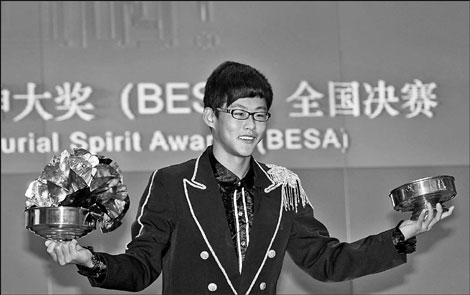Helping those who help themselves
 |
|
Wen Yunfei stages a magic performance at the 2011 Bright China Entrepreneurial Spirit Award ceremony in Beijing. Photos Provided to China Daily |
 |
|
Young BESA participants talk with a judge at the awards ceremony. |
The nonprofit Network for Teaching Entrepreneurship is helping those who haven't got a job create their own businesses. Cheng Anqi finds out more.
Wen Yunfei went from worrying about not being able to pay for high school to earning about 2,000 yuan ($316) a month by running his own magic shop. Since age 10, the now 18-year-old Shandong province native has not only had to worry about how his family of farmers would pay for his education - but also how he could find time to study while helping his parents in the fields. But that's all behind him, since the entrepreneurship class he took in high school has equipped him with the skill set to make a decent living as his own boss.
His magic shop brings him far more money than his family could earn farming.
"I create opportunities for myself instead of looking to others to create those opportunities," Wen says. "The best part is, I can earn my daily bread."
The class that inspired Wen was created by the Network for Teaching Entrepreneurship (NFTE), a nonprofit that teaches students in low-income communities how to found and operate their own businesses.
The idea, as NFTE founder Steve Mariotti puts it, is: "If you can't get a job, you can create your own."
NFTE's programs have helped about 50,000 students translate street smarts into business savvy since 2003.
It helps vocational school students and convicts identify their unique talents to build their businesses.
Most never imagined they could be their own bosses.
The course enabled Wen to fuse his background in magic with creativity to open his Magic and Miracle House, which stages magic performances for special occasions, makes customized magic kits and teaches buyers tricks.
After months of preparing his business plan, Wen won 2,000 yuan from NFTE's 2011 Bright China Entrepreneurial Spirit Award (BESA) to advance his business and educational goals.
The senior at Shandong's Yantai Mechanical Engineering School runs his business on campus and continues to maintain a GPA of at least 3.
And he's capitalized on his compelling story by creating a motivational speaking circuit for himself in the city.
"I still have burdens in life," Wen says. "The only difference is that I've been exposed to entrepreneurship, and that will lead me to lifelong prosperity."
The classes have also transformed the life of Chen Panpan, whose teahouse brings in an income of 60,000 yuan a month.
She was honored among eight BESA finalists at a Beijing gala last week. The 20-year-old says her success stems from both the classes and her ability to predict market trends.
"Starbucks has become so popular through coffee sales," she says. "I thought, why couldn't the same thing happen with tea?"
Her research revealed none of the 14 teahouses in her hometown of Ninghai, Zhejiang province, incorporated tea culture into their operations.
So, Chen opened a store offering tea ceremonies and custom-blend Wanghai tea.
"The classes help you learn vital life skills that teach you to always set goals, aim high and never give up on your dreams," she says.
She hopes to open her second outlet soon, but is too busy with school now.
"I'm definitely learning about time management," she says.
Mariotti says he first realized the impact of entrepreneurship courses when he was teaching special education in the New York City school system in 1982.
He recalls 15 at-risk students planned to drop out of high school.
"That would have been a great blow to me," he says. "Then we had a talk."
He attended a rowdy student party, where the teens told him they believed the classes were dull, except for when Mariotti talked about how he dealt with his import and export trade.
Then, he took off his watch and asked the students: "What would you sell this for?" That lesson started a 30-year odyssey.
"It's easy to see it's working," he says. "You can see it in the classroom's eyes."
Jia Fangqing's transformation can't only be seen in his eyes, but also can be seen in his voice.
The 17-year-old from Xuzhou Electrical and Mechanical Services Vocational School says he used to be too shy to talk to others, while speaking onstage in front of judges, competitors and media at the BESA awards ceremony.
Thanks to the NFTE classes, he can confidently give his 30-second "elevator pitch" - a pitch short enough to make to an executive in a hypothetical elevator ride - about his campus express delivery service.
"Knowing exactly what clients want and talking to them in a timely manner is crucial," Jia says.
He works according to school hours and offers below-market prices.
Jia earns 1,000 yuan a month, 400 of which he can save. It's much better than the 40 yuan a day he previously split with his mother from their work running a small grocery store.
His mother dreaded paying his tuition - a problem the family hasn't had since Jia noticed it took his classmates more than 40 minutes to fetch parcels, because the school is too far from downtown Xuzhou, in Jiangsu province.
Jia plans to continue running his business at university and to someday hire employees.
"It's cool," he says.
"Running a business is something lots of adults don't know how to do, but I can."
















